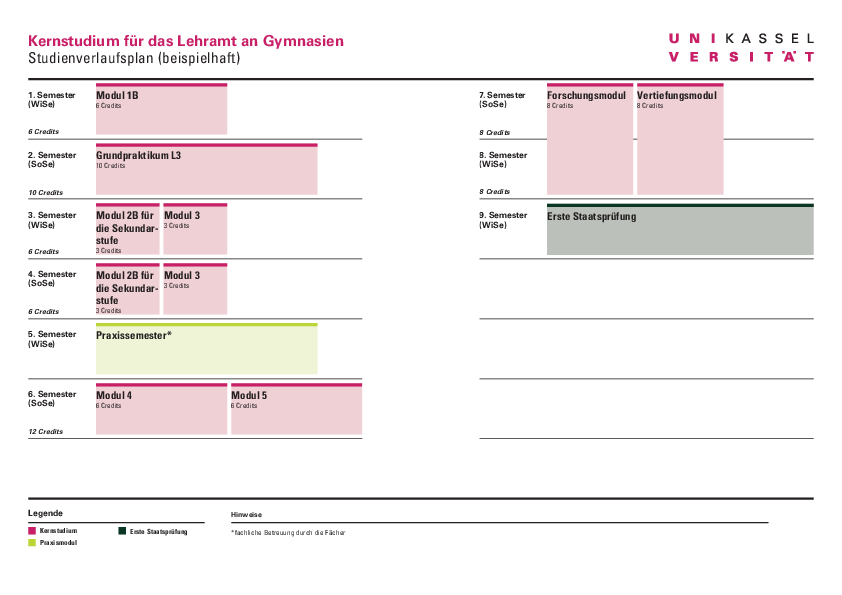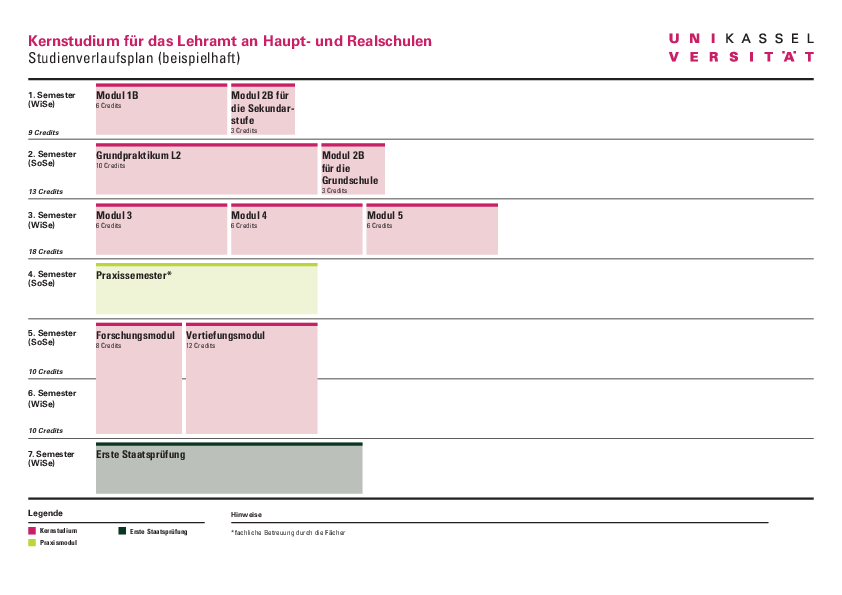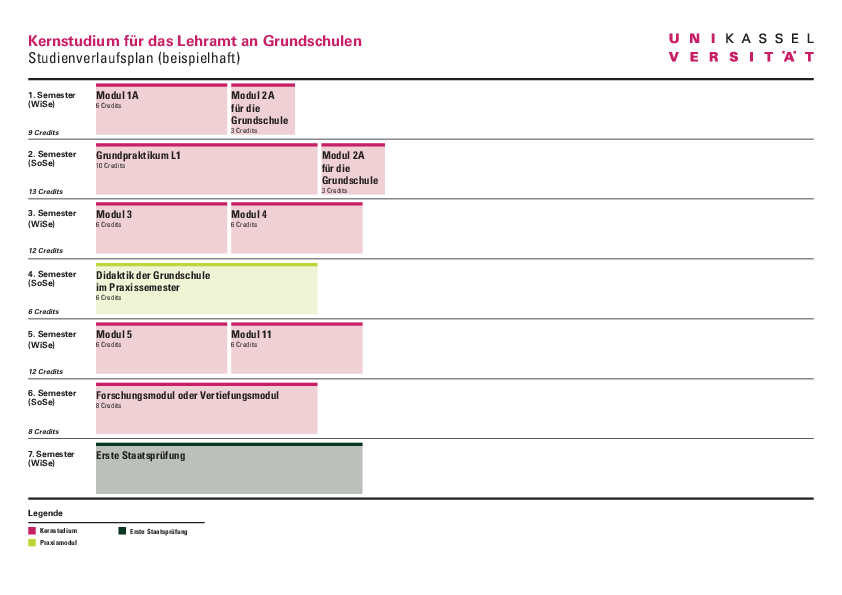About the core curriculum
This page contains automatically translated content.
For the degree course "Teaching at elementary school" (L1), the core study program also includes the competence area "Aesthetic education and movement education" (MPO core study program 2014) or "Aesthetic education" (MPO core study program 2023). According to the MPO Core Studies 2023 for the degree programs Teaching at Primary Schools (L1), Teaching at Secondary Schools (L2), Teaching at Grammar Schools (L3) and Teaching Special Education with a Focus on Inclusion (L5), the "Aesthetic Education" area of competence can be taken in the specialization module.
Study plan
Study plan core study program for the teaching degree Hauptschule and Realschule according to MPO 2023
Download
The core study program covers the following courses
- Teaching degree at elementary school (L1)
- Teaching degree at Hauptschulen and Realschulen (L2)
- Teaching degree for grammar schools (L3)
- BA Vocational Education - specialization in Electrical Engineering/Metal Technology (L4)
- MA Vocational Education - Specialization in Electrical Engineering/Metal Technology (L4)
- BA Vocational Education - Health (L4)
- MA Vocational Education - Health (L4)
- BA IN Business Education (L4)
- MA Business Education (L4)
- Teaching degree in special education with a focus on inclusion (L5) from winter semester 2024/25
- MA Social Pedagogy in Education, Further Education and Training
The core study program covers the following areas:
Department 01 Human Sciences
Department 05: Social Sciences
Department 07: Economics
A look back:
The emergence of the Kernstudium
The foundation of the University of Kassel and the launch of its operations in the winter term 1971 coincided with an era where a major overhaul of educational practices took place. The presence of a new university aimed to engage the local public and other regional interest groups in the field of education, but also meant to pave the way for a reform of educational and study practices and to aid their implementation within a range of settings. Special attention was paid to the education of teachers as a group which was meant to play a pivotal role in the process of rolling out the newly reformed practices across society and institutions; with the Kernstudium representing a core element of the so-called “Kassel model” for teaching education.
The "Kassel model" for teaching education
The newly founded university’s model for teaching education for the first time followed an integrated principle to educate prospective teachers of all school forms, from grammar to primary, middle school and lower secondary education. Prior, university education had been exclusive to future grammar school teachers, while those specialising in primary, middle and lower secondary education acquired their teaching qualifications at polytechnics, universities of applied sciences, colleges or seminars. Under the new model, all prospective teachers began to study ‘under the same roof’, with their individual study programs benefitting from a centralised design and organisation. Merging these different student groups together allowed for a joint focus on science and theory as familiar from universities, and applied teaching as trained in colleges or polytechnics. Modified teaching practises meant that grammar school teaching students were receiving training in teaching methodologies, while primary or lower education teaching students faced an increase in scientific subjects (see Kather 2020, p. 66). While efforts made to enable every teaching student to take the same amount of time to complete their degrees weren’t successful, the main priority has been to align different teaching courses to a level where theory and applied sciences would be mixed, a strategy which became the overriding educational practice for Lehramt courses (teaching courses) at the University of Kassel (see Heipke & Messner 1981, p. 266, and Garlichs 1987, p. 11).
The late Sixties were marked by a reforming euphoria, when it had been believed for years that future schooling institutions would be formally subdivided into consecutive levels, while comprehensive schools, integrated in nature but differentiated to an extent, would become the true centre of the school system. Therefore, teaching courses at Kassel University originally weren’t differentiated according to school forms, but subdivided into primary, middle and high school. It wasn’t until 1989 that the state exam enactments previously in place have been rolled back, and teaching programs at Kassel University were renamed to reflect the main school forms Grundschule, Haupt- and Realschule, and Gymnasium (primary, lower secondary, middle and grammar school).
Early beginnings of the Kernstudium
A joint study of educational and social sciences formed the integrative “core” of the new model for educating future teachers. An underlying critical stance present in the social sciences of the outgoing 1960s has led to growing demands to raise the awareness of future teachers for the wider implications their profession has within society, beside qualifying them to become facilitators of education and schooling reforms. The process of reflection on the contingent nature of the role education and schooling play in society served as encouragement for prospective teachers to stand up for the democratisation of society and the removal of social injustice. Following this, one of the tasks the Kernstudium was covering was enabling students to deal with the processes of socialisation, as well as with political and socio-economic structures, in a critical manner. Another goal addressed by the Kernstudium was to foster a joint understanding of the teaching profession across all Lehramt courses (see Heipke & Messner 1981, and Garlichs 1981, 1987).
The structure of the Kernstudium
The Kernstudium has been organised to reflect the teaching profession in scientific terms, by means of an interdisciplinary structure. Precisely, its structure is drawing upon study fields such as sociology, pedagogy, or psychology, but does not consider them as separate entities. Instead, the Kernstudium is organised alongside study topics and professional competencies, where different perspectives, methodologies, and insights from education and social sciences are brought together within four practice-focused areas:
- Teaching and the curriculum
- School and the workplace
- Socialisation and learning in the social context
- The societal-political context.
Students are meant to undergo a challenging process of reflection on experiences and realities encountered within the above-named settings, such as their own socialisation patterns or individual motives for choosing one’s profession. They are being prepared for their professional lives by means of knowledge transfer, the formation of individual attitudes, and the acquisition of core competencies relevant to working as a teacher. Looking back at the early days of the Kernstudium, project-based study was considered a highly suitable technique to fulfil these demands.
The four areas have been loosely defined on purpose. They are meant to act as a frame-like construct, which students and teaching staff themselves are encouraged to compile, fill, evaluate, and reshape. This approach opens an opportunity for students to voice their learning requirements, interests and goals as well as for any party involved to respond to contemporary issues in didactics, at schools and within society as a whole.
Multi-staged work experience placements (SPS) undermined by a solid theoretical background, also formed an early part of the overhaul of the Kassel University educational program for teachers in the Kernstudium as well as within specialised didactical fields. Notably, the Kassel concept of the SPS pioneered the reform of study programs for grammar school teaching in Hesse and was rolled out countrywide as early as in 1979 (see Garlichs 1987, p. 11).
Continuity and transition at the Kernstudium
In the course of the 1970s, the West German educational reform stalled. Crises within society took their toll on the aspirations to reform society through schooling and education, or to make it more democratic, a goal which eventually lost its priority and even its consensus. Putting the reformed concepts into practice and retaining them has proven considerably more difficult than initially thought. The Kernstudium remained committed to its basic assumptions and original organisational structure but shifted the focus of its study programs to capture individual questions of sense and life, as well as to promote the role of the individual, thereby closely reflecting the tradition of the enlightenment, neohumanism and democracy movements (see Messner, 1988).
Even in the aftermath of the modularisation of study programs at the Kernstudium during the years 2004/2005, its central characteristics remained untouched, while the content of the four main study areas has been revised and renamed based on the KMK standards for educational studies (the German standards for teacher education). Since then, education students of all kinds at the Kernstudium (those studying Lehramt at primary school, lower secondary and middle school, grammar school as well as vocational and business education) have been acquiring skillsets across the following competency areas:
- Teaching, learning, educating
- Observing, counselling, fostering in the pedagogy field
- Developing and co-creating schools and educational institutions
- Education and schooling in the context of society
Finally, since the winter term 2015/2016 the Kernstudium is participating in the Hessian pilot project “Praxissemester” (work experience placement term), a study phase which has replaced the phased out SPS for students of the Lehramt at primary as well as lower secondary and middle schools.
References
Garlichs, Ariane (1981). Das Kernstudium in der Kasseler Lehrerausbildung. In Prisma (27), S. 26-27.
Garlichs, Ariane (1987). Lehrerausbildung. Eine Herausforderung nicht nur für die GhK. Einwände gegen eine Wende. Kassel: Zentrale Druckerei der GhK.
Heipke, Klaus & Messer, Rudolf (1981). Entstehung, Stagnation und Perspektiven der Kasseler Stufenlehrerausbildung. In: Norbert Kluge, Aylâ Neusel, Christoph Oehler & Ulrich Teichler (Hrsg.), Gesamthochschule Kassel 1971-1981. Rückblick auf das erste Jahrzehnt (S. 262-298). Kassel: Johannes Stauda.
Kather, Alexander & Glaser, Edith (2020). Demokratischer Fachunterricht durch demokratische Lehrerbildung? Zur Wissensgeschichte einer veränderten Fremdsprachenlehrerausbildung im Reformprojekt Gesamthochschule Kassel. (In Vorbereitung)
Kather, Alexander (2020). Romanistik an einer Reformuniversität. Entstehung und Entwicklung eines neuen Modells der Fremdsprachenlehrerausbildung in Zeiten der Bildungsreform.Kassel: kassel university press.
Messner, Rudolf (1988). Herkunft, Entwicklung und Perspektiven: Das „Kasseler Modell“ der Lehrerbildung. In: Publik, 11(7), S. 3-4.


